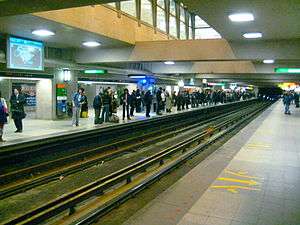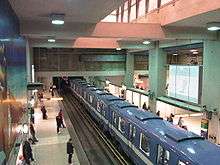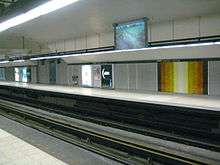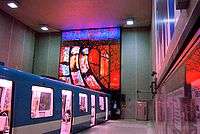Berri-UQAM (Montreal Metro)
Berri-UQAM | |||||||||||||||||||||
|---|---|---|---|---|---|---|---|---|---|---|---|---|---|---|---|---|---|---|---|---|---|
 | |||||||||||||||||||||
| Location |
rue Berri / boul. de Maisonneuve, Montreal Quebec, Canada | ||||||||||||||||||||
| Coordinates | 45°30′55″N 73°33′40″W / 45.51528°N 73.56111°WCoordinates: 45°30′55″N 73°33′40″W / 45.51528°N 73.56111°W | ||||||||||||||||||||
| Operated by | Société de transport de Montréal | ||||||||||||||||||||
| Connections | |||||||||||||||||||||
| Construction | |||||||||||||||||||||
| Depth |
16.8 metres (55 feet 1 inch) (Green) 10.7 metres (35 feet 1 inch) (Orange) 27.4 metres (89 feet 11 inches) (Yellow), 2nd deepest | ||||||||||||||||||||
| Architect |
Longpré et Marchand Gaétan Pelletier (kiosk built in 1999) | ||||||||||||||||||||
| History | |||||||||||||||||||||
| Opened | 14 October 1966 | ||||||||||||||||||||
| Traffic | |||||||||||||||||||||
| Passengers | 13,131,841 entrances in 2011, 1st of 68 (excluding transfers) | ||||||||||||||||||||
| Services | |||||||||||||||||||||
| |||||||||||||||||||||
Berri-UQAM is the central station of the Montreal Metro rapid transit system operated by the Société de transport de Montréal (STM).
Berri-UQAM is located in the Quartier Latin, in the borough of Ville-Marie, in Montreal, Quebec, Canada.[1] The station opened on October 14, 1966, as part of the original network of the Metro.
Berri-UQAM is the 2nd deepest station in the network, and the only one to have 3 lines stacked on each other. Berri-UQAM is also the busiest station in the network, transfers not included.
If transfers were included, the 13 million passengers number would rise to about 35-40 million a year. The Green and Orange Lines pass through Berri, and the Yellow Line terminates there.
Overview


Designed by Longpré and Marchand, the station serves three lines: the Green, Orange, and Yellow lines.
The main part of the station is a cruciform cut and cover volume built underneath the intersection of rue Berri and boul. de Maisonneuve; the volume is so large that the station's design had to include massive pillars to support the street.
This central volume contains three levels. The upper level contains the rectangular mezzanine at its centre, with fare gates on all four sides; the arms extend out to the station's entrances, with two more entrances at the crossing, and are also lined with shops and services.
Staircases lead from the mezzanine to the landings on either side of the Orange Line. These landings provide views of the great volumes over the Green Line platforms below.
From the Green Line level, escalators and hallways connect the rest of the station to the Yellow Line terminus, built in a tunnel a block away under rue Saint-Denis. Due to limited space in the tail tracks, trains reverse both in the tail tracks and in the foretracks leaving the station.
All three lines have side platforms. This station was the first to be equipped with the MétroVision information screens which displays news, commercials, and the time until the next train arrives.
In 2009, the station was made partially wheelchair-accessible through the addition of elevators. Two elevators now connect the Orange Line platforms to the mezzanine. The other two lines are not yet accessible. The mezzanine can be accessed from the street via elevators in the Grande Bibliothèque du Québec and UQAM's Pavillon Judith-Jasmin; however, these buildings are not open throughout the Metro's operating hours. However, there is an elevator in the Saint-Denis exit that opened in June 2010.
The station has 5 entrances:
- 1470, rue Saint-Denis
- 1500, rue Berri
- 1635, rue Berri
- 850, boul. de Maisonneuve est
- 505, rue Sainte-Catherine est
Architecture and art

The station has a total of four independent exits: three integrated into buildings (the Berri, Saint-Denis, and Place Dupuis exits) and one free-standing kiosk (the Sainte-Catherine exit). The station also contains several underground city connections, listed below.
The work of five artists is exhibited in this station. The largest work is a stained-glass mural by Pierre Gaboriau and Pierre Osterrath entitled Hommage aux fondateurs de la ville de Montréal (homage to the founders of the city of Montreal). A gift of the Union régionale de Montréal des caisses populaires Desjardins and installed in 1969, it depicts Jérôme le Royer de la Dauversière, Jeanne Mance, and Paul Chomedey, sieur de Maisonneuve. It is located over the eastern portal of the Green Line tunnel.
Three paintings by Robert LaPalme are located over the main staircase leading to the Yellow Line terminus. Originally located at the entrance to Expo 67, they represent three themes of the Expo: science, recreation, and culture.
A plaque by LaPalme and Georges Lauda, commemorating the inauguration of the Metro, is located at the centre of the mezzanine. It is enclosed in a black circular bench, a popular meeting site, referred to as la rondelle (the hockey puck) or la pilule (the pill) or "le banc des fous" (the crazy bench).
There is also a piece of work located in the newer Sainte-Catherine entrance pavilion, by architect Gaétan Pelletier. The work is a statue of Mother Émilie Gamelin by Raoul Hunter, commemorating Place Émilie-Gamelin (also called Berri Square) in which the entrance is located. The statue is owned by the City of Montreal.
The most recent art piece put in place inside the station is the Wall of Peace on the concourse level of the Yellow Line. It consists of coloured metal plates bearing the word "peace" in multiple languages.
History
Berri-UQAM was the site of the Metro's inauguration on October 14, 1966.
On September 2, 2001, a canister of tear gas was set off inside the station, forcing the evacuation of the 300 passengers inside.
Origin of the name
Berri-UQAM is named for both Rue Berri, so called since 1663 and named after the Université du Québec à Montréal. (The University has taken to using UQAM as its abbreviation which it displays as UQÀM (with a grave accent over the a) as its logo; the Metro station retains the UQAM form.)
Until 1988, the station was named Berri-de-Montigny; rue de Montigny is the former name of boulevard de Maisonneuve in this area.
Small stubs of de Montigny street still survive, in downtown between St-Laurent and St-Urbain and in the suburb Montréal-Est.
Renovations
From August 2010 until mid 2017 the station is currently undergoing a 90 million dollar renovation plan that will change the appearance of the station, secure the tunnels and roofs. Other work being done includes mechanical, structural and architectural improvements.[2]
The first phase of the work was done from August 2010 until the summer of 2011, included the removal of the gray tiles on all 3 platforms and station walls. Temporary walls were put up until the next phase.
The second phase began in January 2012 and will continue until June 2012. The work in this phase includes reinforcing walls, renovating mechanical, structural and architectural components and the removing of four red columns on the mezzanine level staircases. Once this work is completed, the temporary walls and finishes will be removed and replaced by new permanent architectural facings.
Connecting bus routes
Société de transport de Montréal
| Société de transport de Montréal | |||||
|---|---|---|---|---|---|
| Route | Service Times | Map | Schedule direction 1 | Schedule direction 2 | Remarks |
| |
All-day | Map | Direction East | Direction West | |
| |
All-day | Map | Direction North | Direction South | |
| |
Overnight | Map | Direction East | Not passing this station (Direction West) | |
| |
Overnight | Map | Direction North | Direction South | |
| |
Rush Hours, Mornings to Downtown and Afternoons from Downtown | Map | Direction East | Direction West | |
| |
All-day before 10:00PM | Map | Direction West | Terminating (Direction East) | |
| |
24 Hours Daily-Year Round | Map | Direction West | Terminating (Direction East) | No single and unlimited-evening tickets accepted. Free WiFi on select buses. |
Other connecting bus routes
Nearby points of interest
Connected via the underground city
- Université du Québec à Montréal
- Gare d'autocars de Montréal
- Place Dupuis - Hôtel des Gouverneurs
- Grande Bibliothèque
Other
|
|
References
- ↑ "Berri-UQAM". Société de transport de Montréal.
- ↑ Berri-UQAM gets a facelift : MouvementCollectif.org
External links
| Wikimedia Commons has media related to Berri-UQAM (Montreal Metro). |
- Société de transport de Montréal - official web page of the station
- Berri-UQAM metro station geo location
- Montreal by Metro, metrodemontreal.com - photos, information, and trivia
- 2011 STM System Map
- 2011 Downtown System Map
- Metro Map